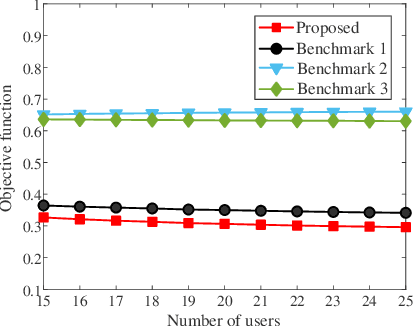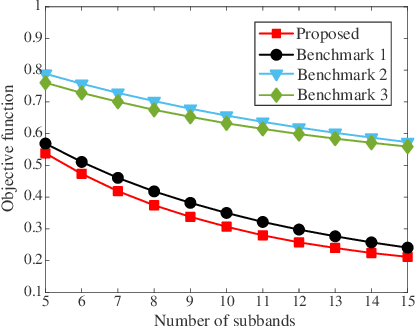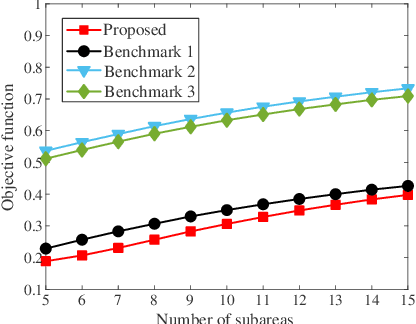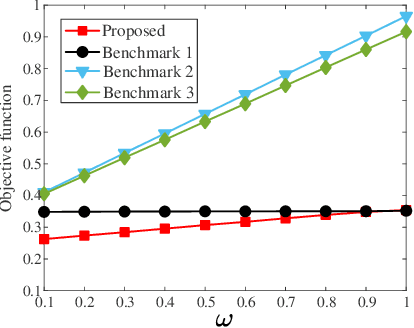Yongna Guo
Enhancing Mobile Crowdsensing Efficiency: A Coverage-aware Resource Allocation Approach
Mar 27, 2025



Abstract:In this study, we investigate the resource management challenges in next-generation mobile crowdsensing networks with the goal of minimizing task completion latency while ensuring coverage performance, i.e., an essential metric to ensure comprehensive data collection across the monitored area, yet it has been commonly overlooked in existing studies. To this end, we formulate a weighted latency and coverage gap minimization problem via jointly optimizing user selection, subchannel allocation, and sensing task allocation. The formulated minimization problem is a non-convex mixed-integer programming issue. To facilitate the analysis, we decompose the original optimization problem into two subproblems. One focuses on optimizing sensing task and subband allocation under fixed sensing user selection, which is optimally solved by the Hungarian algorithm via problem reformulation. Building upon these findings, we introduce a time-efficient two-sided swapping method to refine the scheduled user set and enhance system performance. Extensive numerical results demonstrate the effectiveness of our proposed approach compared to various benchmark strategies.
Joint System Latency and Data Freshness Optimization for Cache-enabled Mobile Crowdsensing Networks
Jan 24, 2025



Abstract:Mobile crowdsensing (MCS) networks enable large-scale data collection by leveraging the ubiquity of mobile devices. However, frequent sensing and data transmission can lead to significant resource consumption. To mitigate this issue, edge caching has been proposed as a solution for storing recently collected data. Nonetheless, this approach may compromise data freshness. In this paper, we investigate the trade-off between re-using cached task results and re-sensing tasks in cache-enabled MCS networks, aiming to minimize system latency while maintaining information freshness. To this end, we formulate a weighted delay and age of information (AoI) minimization problem, jointly optimizing sensing decisions, user selection, channel selection, task allocation, and caching strategies. The problem is a mixed-integer non-convex programming problem which is intractable. Therefore, we decompose the long-term problem into sequential one-shot sub-problems and design a framework that optimizes system latency, task sensing decision, and caching strategy subproblems. When one task is re-sensing, the one-shot problem simplifies to the system latency minimization problem, which can be solved optimally. The task sensing decision is then made by comparing the system latency and AoI. Additionally, a Bayesian update strategy is developed to manage the cached task results. Building upon this framework, we propose a lightweight and time-efficient algorithm that makes real-time decisions for the long-term optimization problem. Extensive simulation results validate the effectiveness of our approach.
Two-Timescale Synchronization and Migration for Digital Twin Networks: A Multi-Agent Deep Reinforcement Learning Approach
Sep 02, 2024



Abstract:Digital twins (DTs) have emerged as a promising enabler for representing the real-time states of physical worlds and realizing self-sustaining systems. In practice, DTs of physical devices, such as mobile users (MUs), are commonly deployed in multi-access edge computing (MEC) networks for the sake of reducing latency. To ensure the accuracy and fidelity of DTs, it is essential for MUs to regularly synchronize their status with their DTs. However, MU mobility introduces significant challenges to DT synchronization. Firstly, MU mobility triggers DT migration which could cause synchronization failures. Secondly, MUs require frequent synchronization with their DTs to ensure DT fidelity. Nonetheless, DT migration among MEC servers, caused by MU mobility, may occur infrequently. Accordingly, we propose a two-timescale DT synchronization and migration framework with reliability consideration by establishing a non-convex stochastic problem to minimize the long-term average energy consumption of MUs. We use Lyapunov theory to convert the reliability constraints and reformulate the new problem as a partially observable Markov decision-making process (POMDP). Furthermore, we develop a heterogeneous agent proximal policy optimization with Beta distribution (Beta-HAPPO) method to solve it. Numerical results show that our proposed Beta-HAPPO method achieves significant improvements in energy savings when compared with other benchmarks.
 Add to Chrome
Add to Chrome Add to Firefox
Add to Firefox Add to Edge
Add to Edge